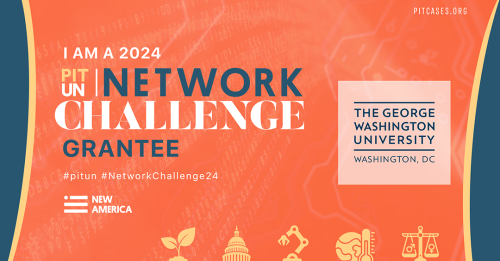George Washington University will host a diverse cohort of students for a four-week data science bootcamp this summer, part of an interdisciplinary educational initiative to tackle health equity and climate resilience while building partnerships with local minority-serving institutions, including Trinity Washington University and the University of the District of Columbia.
The project—which will include lectures, hands-on activities and collaborative, interdisciplinary exercises mentored by faculty, graduate students and local experts—is funded by the Public Interest Technology University Network (PIT-UN) 2024 Network Challenge, a program aimed at advancing equitable innovation in technology across academia, government and civil society.
PIT-UN is a collaboration of 59 U.S. and 4 international universities and colleges dedicated to building the field of public interest technology and nurturing a new generation of civic-minded technologists. In its sixth year, the Network Challenge will distribute approximately $1 million to 10 projects led by PIT-UN members. GW joined PIT-UN in 2020. Four previous projects led by GW faculty from across the university have been funded by PIT-UN grants.
“We are very excited to start on this project,” said Huixia Judy Wang, chair of the Department of Statistics at GW’s Columbian College of Arts and Sciences and a co-principal investigator (PI) on the bootcamp project. “Through this program, students will gain invaluable hands-on experience in data analysis while tackling critical issues such as health equity and climate resilience.”

The Network Challenge project—which includes the summer 2025 bootcamp and runs through a January 2026 final report—is designed to equip diverse students with essential data science skills. At the same time, the coordinators hope to foster a collaborative and inclusive environment and encourage the practical application of those skills to enhance social justice and community engagement, noted Associate Professor of Statistics and project lead PI Tatiyana Apanasovich.
“I would like these students to tap into GW’s network of data science researchers and educators and be inspired—whether it’s to take more classes or pursue future careers in these fields,” she said.
Apanasovich also views the bootcamp as the first step toward future collaborations with the other universities and even hopes to serve as a model for their own burgeoning data science and analytics programs.
“Increasingly, data science knowledge and ability are emerging as an in-demand skill across academic disciplines and in the workforce,” said Provost Christopher Alan Bracey. “GW is proud to partner with other local universities in order to grow data science skills and advance social justice and community engagement for a diverse group of students, particularly as they focus on the major issues of health equity and climate resilience.”
Trinity Washington University, a liberal arts women’s college, is a predominantly Black and Hispanic-serving institution. Over 95 percent of its students are ethnic minorities and 80 percent come from low-income families. The University of the District of Columbia is a public historically Black land-grant university. Both institutions are committed to offering affordable and accessible education to diverse student bodies while promoting academic excellence and social justice, the project partners said.
Since 2019, the Network Challenge has provided over $16 million to 154 projects that have built new courses, research centers, community and government partnerships, certificates and degrees, internships, fellowships and more. The grantee projects focus on educational offerings and career pipeline/placement efforts. Each project, like the GW bootcamp, centers the needs of communities that have historically been excluded from technology design, workforce and policy.
‘Not only will the program provide students with practical skills, but it will also contribute to meaningful educational and societal impact,” Wang said.
For the GW project, the coordinators chose two public interest topics— health equity and climate resilience—that are particularly relevant to minority communities, Apanasovich explained. Teaming with graduate student mentors and local experts, the approximately 20 bootcamp students will work with resources such as climate impact datasets and Centers for Disease Control studies to determine firsthand how environmental factors link to health outcomes in their own communities.
“We want them to realize the power they have to create change through data science,” Apanasovich said. “These students belong to these communities—and they’re the best people to carry messages to these communities.”
Even after the bootcamp, the project coordinators hope bridging the gap between institutions will facilitate an exchange of ideas, enhance collaborative opportunities and promote future joint research initiatives. At the same time, the team will organize a series of post-bootcamp activities including showcasing student achievements through a website and a promotional video.
“I have great faith in these students and in our partner institutions,” Apanasovich said. “They just need a platform to shine—and we can help.”


